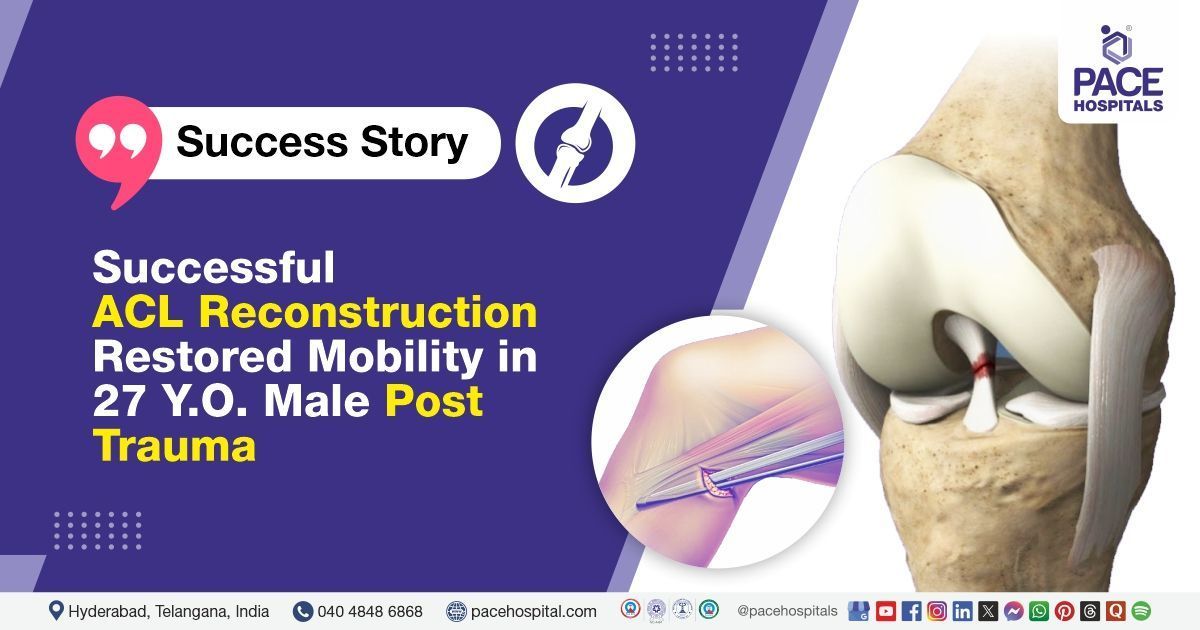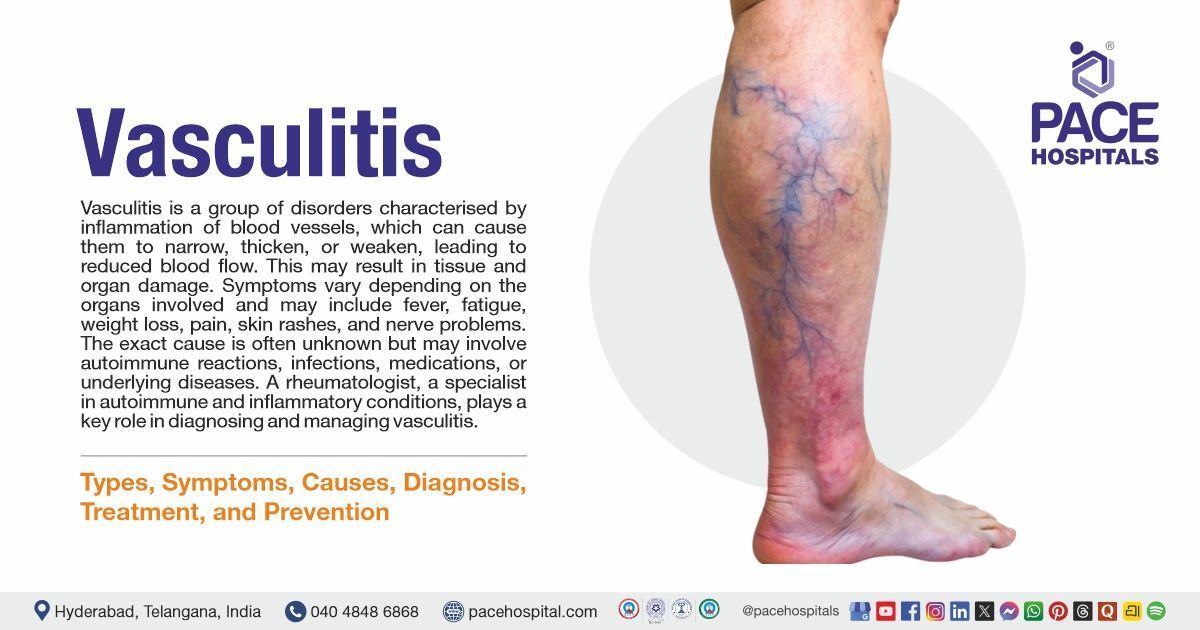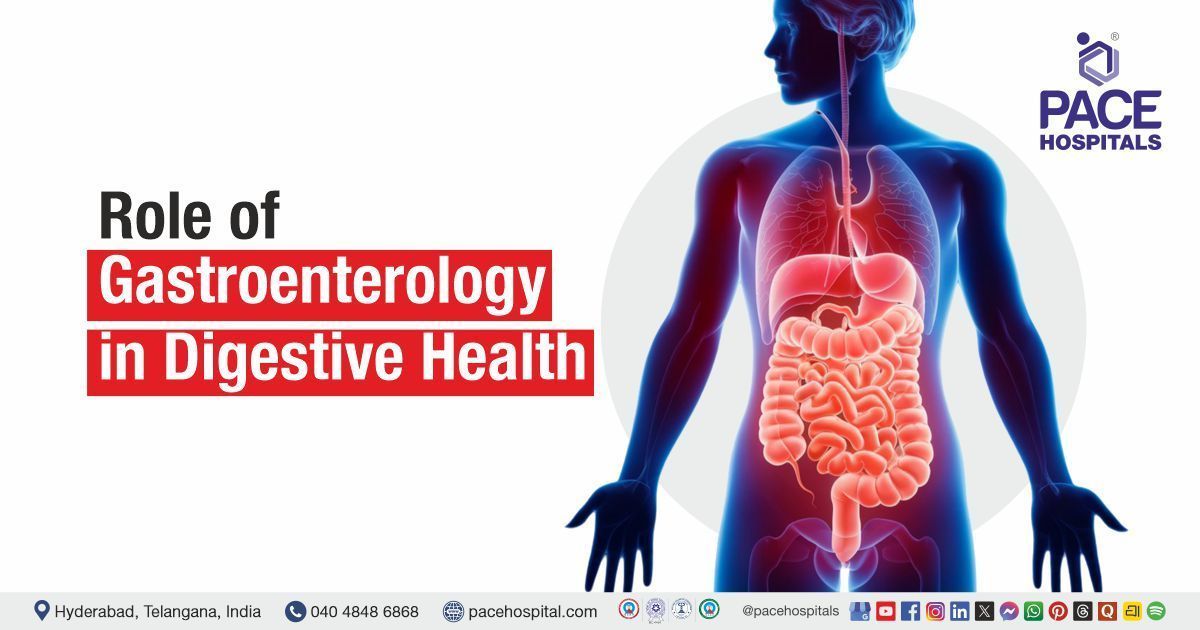Successful ACL Reconstruction Restored Mobility in 27-Year-Old Male Post Trauma
PACE Hospitals
PACE Hospitals' expert Orthopaedic team successfully performed a
Right Anterior Cruciate Ligament (ACL) Reconstruction
for the right knee using an
ipsilateral hamstring graft on a 27-year-old male patient who presented with pain in the right knee, instability while climbing stairs, and difficulty performing daily activities following a fall down the stairs. The surgery was performed to
restore knee stability, relieve symptoms, prevent further complications, and enhance the patient's mobility and quality of life.
Chief Complaints
A 27-year-old male patient with a
body mass index (BMI) of 22.1 presented to the Orthopedics Department at
PACE Hospitals, Hitech City, Hyderabad, with complaints of right knee pain, instability while climbing stairs, and difficulty performing daily activities.
Past Medical History
The patient had an alleged history of blunt trauma to the right knee approximately six months ago, reportedly due to a fall on the stairs. There was no history suggestive of known drug allergies or any known chronic illnesses.
On Examination
On examination, the patient was conscious and oriented with a Glasgow Coma Scale (GCS) score of 15/15. Vital signs were within normal limits. Systemic examination revealed adequate bilateral air entry in the respiratory system, normal heart sounds (S1 and S2) without murmurs in the cardiovascular system, a soft and non-tender abdomen with present bowel sounds, and no focal neurological deficits on central nervous system examination.
Local examination of the right knee showed tenderness over the anterior joint line. Range of motion was grossly restricted with painful terminal flexion. Stability tests demonstrated a positive Anterior Drawer test, positive Lachman test, and a positive Pivot Shift test, indicating anterior cruciate ligament (ACL) insufficiency. The McMurray test was negative, suggesting no meniscal tear. Valgus and varus stress tests, as well as the Posterior Drawer test, were negative, indicating intact collateral and posterior cruciate ligaments. No distal neurovascular deficit was noted.
Diagnosis
Following the clinical examination, the orthopaedic team conducted a comprehensive assessment, which included a detailed review of the patient’s medical history and a focused evaluation of the right knee.
This was followed by a focused assessment of the right knee. Imaging studies were conducted to confirm the diagnosis. An X-ray of the right knee was performed, which did not reveal any bony abnormalities. Subsequently, an MRI of the right knee was carried out, which showed a complete mid-substance tear of the anterior cruciate ligament (ACL). The medial and lateral menisci, patellar cartilage, and femoral chondral surfaces appeared normal on MRI. In addition, investigations including routine blood tests, chest X-ray, and electrocardiogram (ECG) were conducted to assess the patient’s overall health status and confirm fitness for surgery.
Based on the confirmed diagnosis, he was advised to undergo a
Right Anterior Cruciate Ligament (ACL) Tear Treatment in Hyderabad, India,
under the care of the Orthopedic Department, ensuring comprehensive management.
Medical Decision Making
After consultation with Dr. Anand Agroya, Senior Orthopaedic Consultant, a comprehensive evaluation was conducted to establish the most suitable diagnostic and treatment approach for the patient’s right knee injury. Based on a detailed clinical examination and imaging studies, including X-ray and MRI of the right knee, surgical intervention was deemed necessary.
Based on the expert assessment, it was concluded that ACL reconstruction surgery would be the most effective treatment to address the patient’s condition.
The patient and his family were thoroughly counselled regarding the severity of the injury, the planned ACL reconstruction surgery, the potential risks involved, and the necessity of the procedure for restoring knee stability and function.
Surgical Procedure
Following the decision, the patient was scheduled to undergo Anterior Cruciate Ligament (ACL) Reconstruction Surgery in Hyderabad at PACE Hospitals, under the supervision of the expert orthopaedic Department. The following steps were carried out during the procedure:
- Preparation and Anesthesia: The patient was positioned supine, and spinal anesthesia was administered. After sterilizing the surgical area and applying a tourniquet, all pressure points were padded. A time-out was done to confirm the surgical site before inflating the tourniquet.
- Arthroscopic Evaluation: Arthroscopy was performed through medial and lateral parapatellar portals. The procedure confirmed a complete ACL tear with intact menisci. No other joint abnormalities were found.
- Graft Harvesting and Tunnel Preparation: Hamstring tendons from the same leg were harvested for the graft. The ACL insertion sites on the femur and tibia were identified and marked. Tunnels were drilled using a guide pin with the knee hyperflexed to 135 degrees.
- Graft Passage and Fixation: The harvested graft was passed through the tunnels and fixed with Sironix implants. It was cycled to ensure proper tension, resulting in a stable knee with a negative Lachman test. Full range of motion was confirmed arthroscopically.
- Closure and Postoperative Care: The joint was irrigated to clear debris, and the tourniquet was deflated. The graft and portal sites were closed with subcuticular sutures, and sterile dressings were applied. The patient was transferred to SICU with no vascular complications.
Operative Findings
- No abnormalities were observed in the medial and lateral compartments of the knee.
- The patellar cartilage and femoral chondral surfaces were intact.
- Both the lateral and medial menisci appeared normal.
- The anterior cruciate ligament (ACL) was completely torn and hemorrhagic with ruptured components.
- Mild synovitis was noted in the patellofemoral joint.
Postoperative Care
The postoperative period was uneventful. Postoperatively, the patient was monitored in the SICU for a few hours. On postoperative day 1, dressing was changed, and partial weight-bearing mobilization was initiated with the assistance of a walker and brace. During his hospital stay, he received intravenous antibiotics, analgesics, and other supportive treatments. The patient was discharged in a hemodynamically stable condition with prescribed medications and instructions for care.
Discharge Medications
Upon discharge, the patient received prescriptions for antibiotics to prevent postoperative infections, analgesics to control pain and enhance comfort during recovery, and antacids to safeguard the stomach lining from irritation caused by the medications. These treatments were aimed at promoting optimal healing and ensuring a smooth rehabilitation process. The patient was also advised to adhere to the medication regimen and attend all scheduled follow-up appointments.
Advice on Discharge
The patient was advised to perform partial weight-bearing mobilization using a walker and brace strictly until further notice. He was instructed to keep the dressing dry and to apply ice packs every four hours for 10 minutes each time. Additionally, the patient was advised to continue physiotherapy exercises as prescribed, including knee extension, quadriceps strengthening, calf pump exercises, and following the ACL reconstruction rehabilitation protocol.
Emergency Care
The patient was informed to contact the
emergency ward at PACE Hospitals if any of the these symptoms developed, like severe pain at the operated site, discoloration or swelling of the operated limb, excessive bleeding or discharge from the surgical site, chest pain, acute shortness of breath, altered consciousness, low urine output within 24 hours, nausea, vomiting, signs of allergy or drug intolerance, or high-grade fever.
Review and Follow-up Notes
The patient was advised to return for a follow-up visit with the Orthopaedic Doctor in Hyderabad at PACE Hospitals after three days for a dressing change in the outpatient department (OPD), with a prior appointment. Further evaluation and guidance regarding the continuation of physiotherapy would be provided during the follow-up.
Conclusion
This case highlights the effective management of a complete anterior cruciate ligament (ACL) tear through timely diagnosis and appropriate intervention. Comprehensive evaluation and careful postoperative care supported a smooth recovery. The patient was discharged in stable condition with a structured rehabilitation plan to restore knee function and mobility.
Advancing Functional Recovery Through Anatomical ACL Reconstruction in Knee Injuries
This case underscores the critical importance of precise anatomical anterior cruciate ligament (ACL) reconstruction in restoring knee stability and function after a complete ligament tear. Utilising arthroscopic techniques and autologous hamstring grafts enabled accurate tunnel placement and optimal graft tensioning, closely replicating the knee's native biomechanics. The expertise of the
orthopaedic doctor / orthopaedic surgeon is essential in minimising joint trauma and preserving surrounding structures, thereby promoting superior functional outcomes. This approach exemplifies current advancements in sports injury management by emphasising early mobilisation, reduced recovery time, and improved long-term joint health.
Share on
Request an appointment
Fill in the appointment form or call us instantly to book a confirmed appointment with our super specialist at 04048486868











